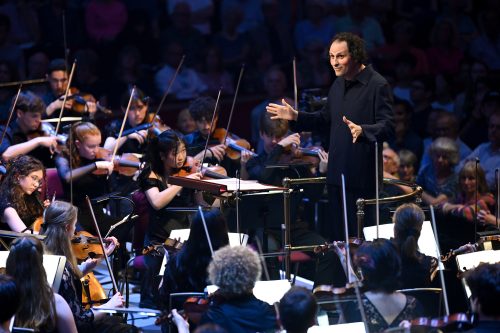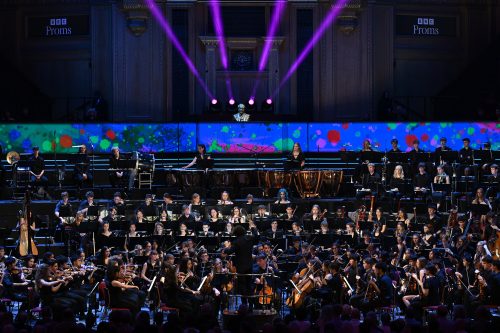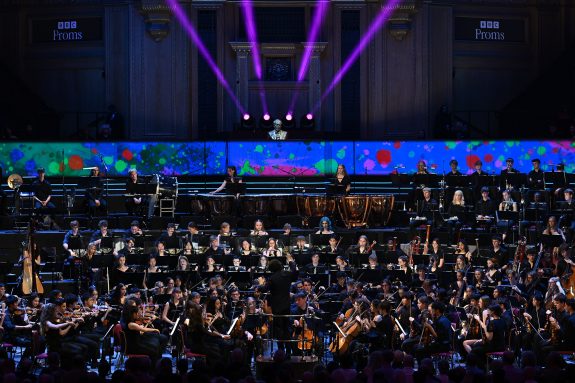
 United Kingdom PROM 30 – Wagner, Mazzoli, Howard, Mahler: Musicians from NYO Inspire, The National Youth Orchestra / Alexandre Bloch (conductor), Tess Jackson (conductor, Howard). Recorded (directed by Rhodri Huw) at the Royal Albert Hall, London, 10.8.2024 and available for a limited time on BBC iPlayer. (JPr)
United Kingdom PROM 30 – Wagner, Mazzoli, Howard, Mahler: Musicians from NYO Inspire, The National Youth Orchestra / Alexandre Bloch (conductor), Tess Jackson (conductor, Howard). Recorded (directed by Rhodri Huw) at the Royal Albert Hall, London, 10.8.2024 and available for a limited time on BBC iPlayer. (JPr)

Wagner – The Flying Dutchman – overture
Missy Mazzoli – Orpheus Undone
Dani Howard – Three, Four AND … (BBC co-commission, world premiere)
Mahler – Symphony No.1 in D major
On their website you can read how ‘The National Youth Orchestra was founded in 1948 as a post war symbol of hope and confidence. For over 70 years our pioneering spirit has made us a leader in high quality music education and a champion of teenage potential. We activate teenagers’ confidence, optimism and skills to play their part in the world today, through performing and sharing extraordinary music. We open doors for young people, equipping them with new ideas, new experiences, new friends and new music to master. By developing their potential as role models, we employ music to create a movement of changemakers making a positive impact for their generation.’
What a delight it was to see and hear the 160 talented young musicians at this BBC Prom and in a demanding programme which saw them overcome its challenges with flying (Dutchman!) colours. Longborough Festival Opera’s Wagner was played recently with only 60 musicians, here his overture from The Flying Dutchman had an orchestra virtually twice the size the composer envisioned. They certainly made an impressive sound through TV loudspeakers, and it must have nearly lifted the roof off the venerable Royal Albert Hall. Battling the waves they certainly were on the storm-tossed North Sea with the wind whistling through the rigging of the Dutchman’s ship. Briefly the storm abates and we glimpse his plight in some plangent woodwind before the overture ends in blazing brass as the ship battles the waves once more; though there also is the suggestion of the deliverance from his curse the Dutchman craves. Alexandre Bloch replaced previously advertise Nathalie Stutzmann (who is conducting Tannhäuser at Bayreuth) and led his young musicians through a spirited and atmospheric account giving equal weight to the quieter passages as to the more bombastic ones.
American composer Missy Mazzoli suggests her short 2020 work Orpheus Undone is ‘an exploration of two brief moments in the Orpheus myth — the moment that Eurydice dies, and the moment that Orpheus decides to follow his lover into the underworld’. Introducing it on TV composer and comedian Vicky Stone suggested it was concerned with ‘stretching time’ and indeed it seemed a very long fifteen minutes before it finished. The almost constant tapping on a wooden block suggested time passing while it is otherwise just a succession of different musical effects played with varied tempi against one another whilst unpinned by tinkling harp and piano before it all just comes to an end. I suspect what we heard had more to do with A.I. than divine inspiration. Nevertheless, the NYO showed great commitment to the cause.
All in a good cause however was Dani Howard’s world premiere Three, Four AND … that bassoonist Linton Stephens (introducing the Prom on TV) said was ‘written in celebration of NYO musicians, as well as their Inspire scheme, a free programme for underrepresented teenagers to access orchestral opportunities.’ There were a hundred who had benefited from NYO Inspire playing throughout the hall: in the choir seats, the upper tier boxes, the circle, the gallery and, towards the end, standing in the aisles. Congratulations to Tess Jackson, the orchestra’s associate conductor, and (presumably?) other members of the music staff for coordinating it all and creating such an amazing 360º spectacle. But, and there is a big but, even though Howard’s piece (barely 13 minutes) didn’t begin with a wooden block – though later there were two xylophones sounding much the same – there was finger clicking, foot stamping and banging on a big bass drum introducing us to a soundworld not far removed from that of the Mazzoli we had just heard. The playing of 260 (!) musicians had impressive unanimity until Three, Four AND … also just abruptly stopped.

I wonder if Bloch and the NYO had really tamed the RAH’s infamous acoustics so that the soft beginning of Mahler’s First Symphony – which the composer called ‘a sound of nature’ – was heard by everyone in the hall and not just by those watching on TV or listening on radio. The music emerged from hushed strings and the cuckoos sounding in the woodwind, and then marched forth with allusions to the composer’s vocal music. First, we heard ‘Ging heut’ Morgen übers Feld’ from Songs of a Wayfarer, then ‘Der Trompeter von Säckingen’ and ‘Hans und Grete’. Later there was Mahler’s use of ‘Frère Jacques’ (known in the German speaking world as ‘Brother Martin’) in the third movement. That began with mournful double basses before the sombre music unwound through the entire orchestra until interrupted by a grotesque dance with all that Klezmer music with which Mahler alludes to his Jewish roots. (At this point it was also is if Bloch and the NYO were going to launch into a selection from Fiddler on the Roof.)
The young players haven’t got Mahler in their blood yet (how could they?) but it all built up a sufficient head of steam over the first three movements to make the finale as epic as it must be when played by an orchestra of 160! Here the stirring brass chorale with most of the section standing ushered in the heroic final bars which is the exultant celebration of the triumph of life over death which everything preceding it has led up to. Bloch – conducting without a score – appeared the perfect choice to cajole those massed in front of him through this sublime music and kudos throughout all that we heard to the NYO’s leader Rose Gosney.
The best was left till last: Bloch – with something of Simon Rattle about him – spoke of how he had been in the UK for ten days and had missed the Olympics in his home country, France. So, we got a French encore: the Farandole from Bizet’s L’Arlésienne Suite No.2. However, instruments were quickly set aside and all concerned – that means the Inspire players too – performed a cappella with a succession of vocal effects this time. Totally bonkers but great fun nonetheless.
Jim Pritchard
